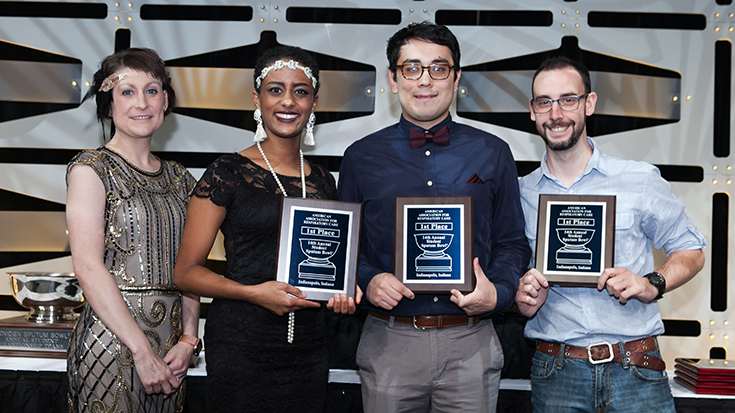
Historically, respiratory therapists seeking a new job were interviewed for that job by the people they would be working for. Never did anyone even consider they might be interviewed by the people they’d be working with.
These days, however, more and more departments are adding peer interviewing to the mix, with the goal being to make sure the new hire will be compatible with the overall culture of the department.
Lisa Houle, MS, RRT, director of cardiopulmonary services at Baptist Health La Grange in La Grange, KY, has been using this technique for a number of years now, and she says it works great.
Another point of view
“Peer interviewing is the process of having respiratory team members speak with the prospective candidates for positions within the department,” explained Houle. “The peer team has consistent questions that are asked of the candidates so comparison can be made to ensure the best fit.”
She believes peer interviewing is important for her department for a number of reasons. “First is the need to work as a team,” said Houle. ”The department at Baptist Health La Grange is small and very much a family. We need to ensure the candidate has the same passion for patients and profession, and purpose for providing exceptional care and education to the patients, families, and staff.”
Because her department is small, she emphasizes everyone works together toward common goals, and if a new hire ends up being a bad fit for the department, everyone will feel the stress and become less effective in their jobs.
Having a peer team to help her select the right candidate provides another point of view on the individual being considered and helps ensure whoever is selected will be right for Baptist Health La Grange.
It’s a lesson Houle learned from experience, noting she did many interviews prior to the implementation of the peer interviewing process, and while most of the time her singular point of view worked out okay, there were times when it didn’t, and that led to “frustration and dysfunction within the department.”
This is how it works
So, how does peer interviewing work in her department? Houle says her team consists three staff therapists — Tony McGhee, RRT, RPFT, Debbie Sullivan, CRT, and Lori Finn, RRT. All are day shift therapists who provide direct patient care, are active in the hospital’s unit-based council, and have been cross-trained to provide outpatient testing as well.
A training class, which is run by the hospital’s human resources department, is required to become a part of the peer interviewing team and all three of her team members have gone through it.
When someone applies for a job in the department, Houle first conducts a phone interview, and if the candidate shows promise, they are invited in for an in-person interview that always includes an interview with the peer team. “Generally, we complete the peer interview and my interview on the same day,” said Houle.
The peer interviewers have a list of questions they developed in the training class that they ask each job candidate —
- What is your biggest weakness?
- Tell me about your most difficult work experience.
- What are your strengths?
- Tell me about a time you had to deal with a difficult/irate patient or co-worker.
- What personal skill or work habit have you struggled to improve?
- What interests you most about this job?
The team also learned how to score each question in the peer interviewing class, but Houle says her department takes a little more relaxed approach. “Since we are so tight knit, the team and I meet after the interviews and discuss our thoughts, what went well during the interview, and what are our concerns related to the candidate,” she said.
Importantly, a consensus is required for the job candidate to get the position. If everyone is not in agreement, then an offer is not extended.
“Everyone involved in the interview process has a unique view,” explained Houle. “With our different perspectives we may pick up on key points — good or bad — that another may miss.”
Fortunately, she says disagreements are fairly rare and they haven’t had any in recent memory. “I think it’s a healthy screening process on the front end, as well as all of us being a team that has helped us identify appropriate candidates,” she said.
When disagreements have occurred, she says they have simply stayed together to discuss the situation until a final decision could be made.
“In the past, we have followed the peer team, when I wasn’t sure, and followed my suggestion when the peer team didn’t have a great impression,” said Houle. “We have learned from experience with those employees who didn’t work out that we all need to be on the same page.”
Six good tips
Houle and her peer interviewing team have these six suggestions for any RT who is faced with a peer interview when looking for a new job —
- Relax, we are all respiratory therapists. Our goals should be the same.
- Be open and honest. It does neither of us any good if you “fake it” to get the job. You may not fit into our organization, but the right organization is out there for you.
- It’s (mostly) not about the technical skills at the peer interview. It is about how you fit into the department.
- Connect with the individuals. The RT team is important and needs to support the individual team members.
- You are interviewing us as well as us interviewing you. Don’t be afraid to ask questions to ensure we are the right fit for you.
- Be engaged and take notes (if you need to). It’s the entire package that we see — not only what you say, but how it is said and your body language that comes across.
Lisa Houle believes peer interviewing has made her department stronger. “We all need to work together to provide care to our patients, and one person can make or break a department,” she said. “As RTs we need to ensure a healthy team environment, and that means all of us together.”
Email newsroom@aarc.org with questions or comments, we’d love to hear from you.
















